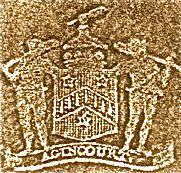Fictional
- The Lubbock family, fictional characters in the situation comedy Just the Ten of Us
- Lubbocks are mythical purple insectoid creatures in Diana Wynne Jones's House of Many Ways
Lubbock is an English surname. Notable persons with that surname include:

Wodehouse is an English surname and barony.

John Lubbock, 1st Baron Avebury, 4th Baronet,, known as Sir John Lubbock, 4th Baronet from 1865 until 1900, was an English banker, Liberal politician, philanthropist, scientist and polymath. Lubbock worked in his family company as a banker but made significant contributions in archaeology, ethnography, and several branches of biology. He coined the terms "Paleolithic" and "Neolithic" to denote the Old and New Stone Ages, respectively. He helped establish archaeology as a scientific discipline, and was influential in debates concerning evolutionary theory. He introduced the first law for the protection of the UK's archaeological and architectural heritage. He was also a founding member of the X Club.

Sir John William Lubbock, 3rd Baronet FRS was an English banker, barrister, mathematician and astronomer.

Baron Avebury, of Avebury in the County of Wiltshire, is a title in the Peerage of the United Kingdom. It was created 22 January 1900 for the banker, politician and archaeologist Sir John Lubbock, 4th Baronet. He was succeeded by his eldest son, the second Baron. On his death the titles passed to his nephew, the third Baron. He was the son of Harold Fox Pitt Lubbock, fourth son of the first Baron, who died in 1971. The title then passed to the third Baron's first cousin, the fourth Baron, the son of Maurice Fox Pitt Lubbock, sixth son of the first Baron. The fourth baron was a Liberal Democrat politician and one of the ninety excepted hereditary peers who remained in the House of Lords after the passing of the House of Lords Act 1999. He was succeeded by his son, the fifth Baron, in 2016.
John Lubbock is the name of:

Sir John William Lubbock, 2nd Baronet FRS was an English banker.
The Reverend William Lubbock MA BD (Cantab) was an English divine, Fellow of Caius College, Cambridge, and Church of England clergyman. He founded the famous English family of Lubbock.
Wilmot is a surname, and may refer to:
Blackett or Blacket is a surname of English derivation.

de Burgh is an Anglo-Norman surname deriving from the ancient Anglo-Norman and Hiberno-Norman noble dynasty, the House of Burgh. In Ireland, the descendants of William de Burgh (c.1160–1206) had the surname de Burgh which was gaelicised in Irish as de Búrca and over the centuries became Búrc then Burke and Bourke.
Cunliffe as an English surname derives from a former place near Rishton, Lancashire.

High Elms Country Park is an extensive 250-acre (100 ha) public park on the North Downs in Farnborough in the London Borough of Bromley. It is a Local Nature Reserve, and together with the neighbouring Downe Bank, a Site of Special Scientific Interest. The park surrounds High Elms Golf Course, and has extensive woodland, chiefly oak and beech, chalk meadows and formal gardens. It also has a cafe, a visitor centre, nature and history trails and car parks.
Wyndham is a surname and a given name. Notable people with the name include:
Baring is a surname. Notable people with the surname include:
Tollemache and also spelled Tallemache or Talmash is an English surname which may refer to:
Greenhill is a surname. Notable people with the surname include:
Monson is a surname. Notable people with the surname include:
Wake is a surname. Notable people with the surname include:
Alfred Lubbock was an English insurance underwriter and banker. He is best known as an amateur cricketer who played first-class cricket for a variety of sides including Kent County Cricket Club and the Marylebone Cricket Club between 1863 and 1875. He was considered to be one of the best batsman of his era, comparable to WG Grace, and also played association football, playing for Old Etonians in the 1875 FA Cup Final.

The Smith family is an English aristocratic and banking family founded by Thomas Smith (1631–1699), the founder of Smith's Bank of Nottingham. Its members include the Marquess of Lincolnshire (extinct), the Viscount Wendover (extinct), the Barons Carrington, the Baron Pauncefote (extinct), the Barons Bicester, the Bromley baronets and many Members of Parliament. Originally named Smith, the branch of the Barons Carrington assumed the surname Carington, the branch of the Bromley baronets the surname Bromley and the branch of the Baron Pauncefote the surname Pauncefote.